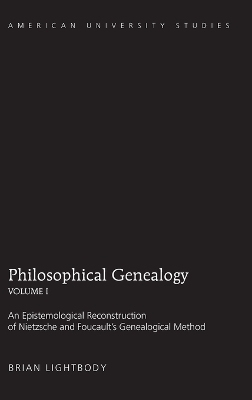American University Studies
2 primary works
Book 208
Philosophical Genealogy Volume I: An Epistemological Reconstruction of Nietzsche and Foucault's Genealogical Method is a rigorous examination of the philosophical investigatory practice known as "genealogy". This critique of the philosophical tradition leads to the creation of new values. Both Nietzsche and Foucault extolled these critical and emancipatory virtues of genealogy.
Volume I examines the principal ontological and epistemological problems with Nietzsche and Foucault's respective uses of the genealogical method. It elucidates the differences between genealogy and other forms of historical inquiry before turning to explicate, in great detail, the three axes of genealogical inquiry: the power axis, the truth axis and the ethical axis. Volume I explains the very important role the body plays in a genealogical investigation before examining several of the problems with the doctrine of perspectivism - a central component to a genealogical inquiry.
Philosophical Genealogy Volume I provides a thorough and incisive analysis of essay two of On the Genealogy of Morals, as well as the "the means of correct training" section in Discipline and Punish, while reaffirming the problems that have been examined in previous chapters and pointing toward a solution that will be further explicated in Philosophical Genealogy Volume II.
Volume I examines the principal ontological and epistemological problems with Nietzsche and Foucault's respective uses of the genealogical method. It elucidates the differences between genealogy and other forms of historical inquiry before turning to explicate, in great detail, the three axes of genealogical inquiry: the power axis, the truth axis and the ethical axis. Volume I explains the very important role the body plays in a genealogical investigation before examining several of the problems with the doctrine of perspectivism - a central component to a genealogical inquiry.
Philosophical Genealogy Volume I provides a thorough and incisive analysis of essay two of On the Genealogy of Morals, as well as the "the means of correct training" section in Discipline and Punish, while reaffirming the problems that have been examined in previous chapters and pointing toward a solution that will be further explicated in Philosophical Genealogy Volume II.
Book 209
Philosophical genealogy is a distinct method of historical and philosophical inquiry that was developed by the nineteenth-century philosopher, Friedrich Nietzsche, and subsequently adopted and extended by the twentieth-century philosopher, Michel Foucault. In brief, genealogies critically examine the historical origin of philosophical concepts, ideas and practices. They challenge the value of traditional methods of philosophical inquiry along with the results that these inquiries produce.
Philosophical Genealogy Volume I: An Epistemological Reconstruction of the Genealogical Method explored the three axes of the genealogical method: power, truth and the ethical. In addition, various ontological and epistemic problems pertaining to each of these axes were examined. In Philosophical Genealogy Volume II: An Epistemological Reconstruction of the Genealogical Method, these problems are now resolved. Volume II establishes what requisite ontological underpinnings are required in order to provide a successful, epistemic reconstruction of the genealogical method. Problems regarding the nature of the body, the relation between power and resistance as well as the justification of Nietzschean perspectivism, are now all clearly answered. It is shown that genealogy is a profound, fecund and, most importantly, coherent method of philosophical and historical investigation which may produce many new discoveries in the fields of ethics and moral inquiry provided it is correctly employed.
Philosophical Genealogy Volume I: An Epistemological Reconstruction of the Genealogical Method explored the three axes of the genealogical method: power, truth and the ethical. In addition, various ontological and epistemic problems pertaining to each of these axes were examined. In Philosophical Genealogy Volume II: An Epistemological Reconstruction of the Genealogical Method, these problems are now resolved. Volume II establishes what requisite ontological underpinnings are required in order to provide a successful, epistemic reconstruction of the genealogical method. Problems regarding the nature of the body, the relation between power and resistance as well as the justification of Nietzschean perspectivism, are now all clearly answered. It is shown that genealogy is a profound, fecund and, most importantly, coherent method of philosophical and historical investigation which may produce many new discoveries in the fields of ethics and moral inquiry provided it is correctly employed.

